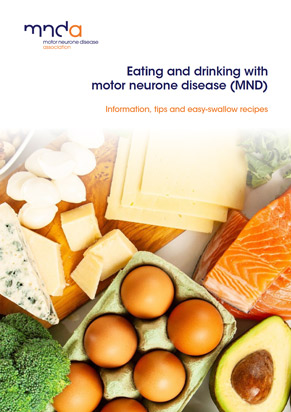If MND affects swallowing, eating and drinking, mealtimes can take longer and you may eat less. As a result, you could lose weight, which also happens if your muscles waste. Weight loss can impact on your wellbeing.
Swallowing difficulties can also affect social occasions, where food and drink are involved.
Select from the following options or search for content by need with our:
Care information finder
"You may never have swallowing difficulties, but no two people with MND are the same. It's so difficult to predict the symptoms."
Our guide - Eating and drinking with motor neurone disease
This full colour publication reads more like a cookery book than a guide. It is designed to support you if you have problems with swallowing, eating and drinking.
“I think the tips given are very useful. The recipes are great and good for the family or carer to try too.”
Packed full of information, tips and easy-swallow recipes, it can help you maintain the joy of eating and drinking, for as long as possible. The recipes include dishes from families affected by MND, professionals and celebrity chefs.
You can request a free copy from our helpline MND Connect or you can view the guide here.
Access our web app of the guide for use on mobile devices such as smart phones or tablets (see next drop down for more detail).
This guide has been endorsed by the British Association for Parenteral and Enteral Nutrition (BAPEN).
Web app - Eating and drinking with motor neurone disease
Our handy web app for the Eating and drinking guide enables access on mobile devices, such as smart phones or tablets. This appealing resource includes all the recipes from the guide, along with a summary of the information.
Open the web app on your smart phone or tablet and add a shortcut to the device's home screen. Instructions for this are provided on the first page of the web app in How do I use this web app?
You can then access the content quickly, for example, when shopping for recipe ingredients or preparing meals.
Who can help with swallowing, eating and drinking?
If you have any concerns about your swallow, ask your GP to refer you to the following specialists for support:
- a speech and language therapist (SLT) can assess your swallowing ability and help with swallowing techniques
- a dietitian can advise on how to meet your nutritional needs and maintain your weight
- an occupational therapist can help source equipment and aids to help you when eating and drinking.
Your GP, speech and language therapist and dietitian can also advise if you have saliva problems. With MND, you may get thin or thick saliva. If you have swallowing difficulties, thin saliva can pool in the mouth and be difficult to clear. Thick saliva can cause your mouth to feel dry or sticky, and make swallowing harder.
See information sheet 7A – Swallowing difficulties for information about swallowing difficulties, saliva support and coughing when eating or drinking.
We recommend assessment from a relevant health or social care professional before buying equipment or aids. Some items may be available free of charge or on loan from health and social care services.
If you need thickeners to change the consistency of food or drink, you may be able to get these on prescription. Ask your speech and language therapist for advice about how to use thickeners in a safe way.
What can help me decide whether to use tube feeding?
If you begin to experience any changes to the way you swallow, you may wish to know more about different ways to get the food and fluids you need. For more details about tube feeding, see our page on Treatments and medication and information sheet 7B – Tube feeding. Being fully informed can help you make timely decisions about treatments.
Other decision aids
myTube website
See the myTube website for further information, which explores tube feeding through video and information content.
This was developed by SITraN – the Sheffield Institute for Translational Neuroscience, with video contributions from people living with MND and their carers.
Gastrostomy tube - is it for me?
Researchers at Southampton University have developed Gastrostomy tube - is it for me?, a web-based patient decision aid for people with MND, who are considering tube feeding with a gastrostomy tube.
It aims to help people living with MND choose whether they want to be fitted for tube feeding now. If they decide not to go ahead, they may want to revisit the decision later. This aid also enables you to download a PDF document of the content.
The team who developed the tool have produced a short video explaining more about the tool, and how it can help people make an informed decision.
The tool is the result of the DiaMoND research project led by Southampton University, funded by the MND Association and Marie Curie.
Is there any other information that can help?
You may find our main guide useful: Living with motor neurone disease. This provides an overview of the disease and how to manage its impact. This can be downloaded or ordered as a printed pack from our helpline, MND Connect.
Our Types of care booklet gives an overview of the range of care available if you have MND or Kennedy's disease.
Our pocket sized booklet What you should you expect from your care can help support discussions with health and social care professionals. This may help lead to better outcomes for treatment and care with MND and contains the main points from the NICE guideline on motor neurone disease. NICE guidelines are produced by the National Institute of Health and Care Excellence, providing recommendations to help professionals support specific conditions, such as MND.
You may come across medical and research terms when reading about MND - see our page on What do all the words and initials mean?
Page last updated: 18 February 2025
Next full review: February 2027

